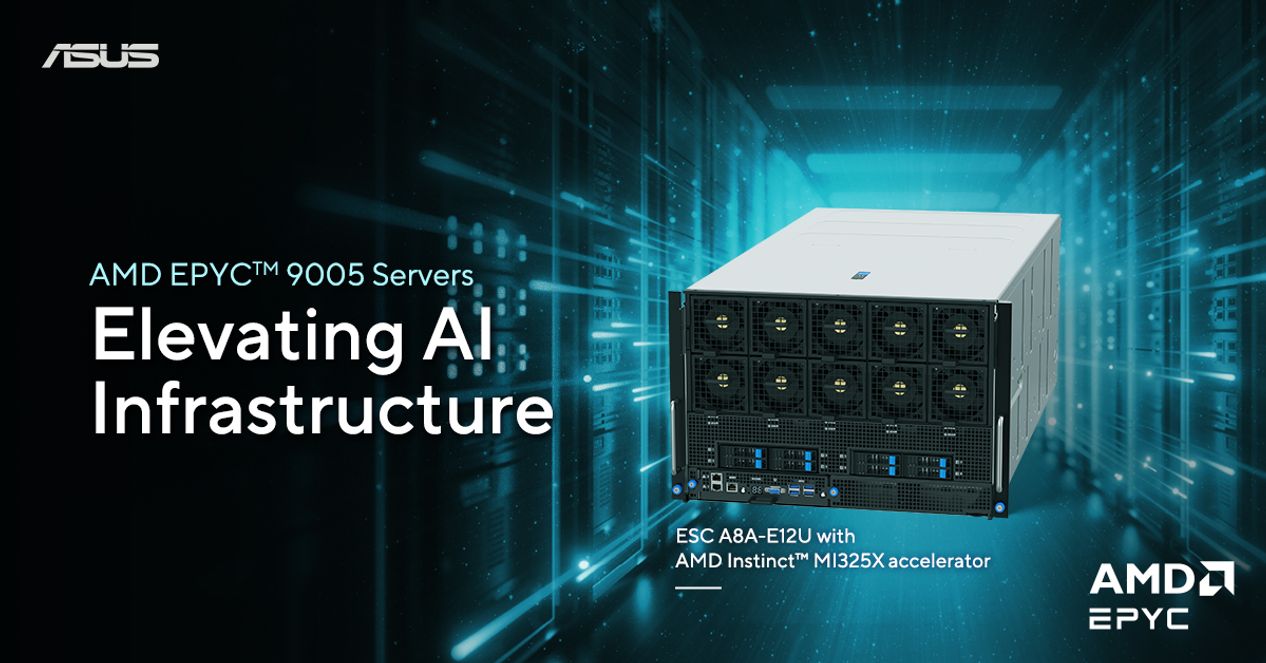Elevating AI infrastructure by setting new standards in performance and density
KEY POINTS
- AI servers: ESC A8A-E12U with EPYC 9005 CPUs and MI325X accelerators and ESC8000A-E13P deliver parallel computing and flexible networking
- Scalable multi-node server: RS520QA-E13 with high memory capacity to deliver blazing speeds of 6000 MTS for data-intensive workloads
- General-purpose servers: RS720A-E13, RS700A-E13, RS521A-E12 and RS501A-E12 designed to efficiently process live data across diverse workloads

TAIPEI, Taiwan, October 11, 2024 — ASUS today announced a series of servers powered by the groundbreaking AMD EPYC™ 9005-series processors, setting new standards in performance and density for AI-driven data center workloads. The full line-up includes ASUS ESC A8A-E12U supporting AMD Instinct™ MI325X accelerators, and ASUS ESC8000A-E13P GPU servers, capable of supporting eight GPUs for large-scale AI model training, ensuring unmatched computational power. ASUS RS520QA-E13 is a multi-node server for EDA and cloud computing. ASUS offers versatile solutions including RS720A-E13, RS700A-E13, and RS521A and RS501A for general-purpose tasks. These servers are engineered to deliver excel performance across a wide range of applications, meeting the demands of the most rigorous workloads.
At the core of these servers lies AMD EPYC 9005-series processors, previously codenamed Turin, and based on the Zen 5 architecture with up to 192 cores / 384 threads and up to 5GHz frequencies, powerhouse CPUs designed to elevate AI-driven data center workloads to unprecedented levels. With industry-leading vCPU density, EPYC 9005-series processors combine optimized compute and AI capabilities to deliver superior performance in AI inference, whether handling mixed or traditional tasks. This lineup diversity is unified by the x86 architecture, enables customers to easily integrate ASUS servers powered by AMD EPYC 9005-series processors into their existing x86 infrastructure. This allows for efficient transitions and migrations within the data center, ensuring continuity and maximizing operational efficiency.
"5th Gen AMD EPYC processors and the latest AMD Instinct MI325X accelerators deliver the compute capabilities our customers require for their most demanding AI-enabled data center workloads," said John Morris, corporate vice president, Enterprise and HPC Business Group, AMD. "Our highly-performant compute technologies allowed us to build an advanced, diversified enterprise portfolio that addresses the rapidly evolving needs of our customers and the modern data center."
AI servers: ESC A8A-E12U and ESC8000A-E13P
ASUS ESC A8A-E12U and ESC8000A-E13P are eight-GPU servers that have been specifically designed to deliver parallel computing and flexible networking. ESC A8A-E12U features a 7U form factor, dual AMD EPYC 9005-series processors, support AMD Instinct MI325X accelerators and include a direct GPU-to-GPU interconnect to deliver up to 6TB/s bandwidth for efficient scaling for large AI models and HPC workloads. The ESC8000A-E13P server, with its powerful AMD EPYC processors, ample memory, and full compliance with the NVIDIA MGX architecture, presents a compelling opportunity to significantly enhance support for NVIDIA OVE and NIM. By leveraging its capabilities, users can create dedicated instances, accelerate simulations and training, enable real-time collaboration, and ensure the infrastructure scales seamlessly to meet the growing demands of OVE and NIM projects, fostering further innovation and adoption.
Scalable multi-node server: RS520QA-E13
The ASUS RS520QA-E13 is a powerhouse server customized for electronic design automation and cloud computing applications. Featuring advanced AMD EPYC 9005-series processors, it stands out with remarkable memory expandability, supporting configurations of 12+8 DIMMs per node. This enables blazing speeds of 6000MTS for 1DPC and 4400MTS for 2DPC. Its innovative front access design offers flexibility, while the ergonomic handle and toolless bracket facilitate effortless maintenance. Engineered for superior thermal performance, RS520QA-E13 can support processors up to 400W using efficient air-cooling solutions, making it a top choice for demanding workloads.
General-purpose servers: RS700A-E13, RS720A-E13, RS521A-E12 and RS501A-E12
ASUS RS720A-E13 and RS700A-E13, powered by AMD EPYC 9005-series processors with up to 192 cores, support up to 24 DIMMs and have a maximum CPU TDP of up to 500W. The GPU-optimized design of RS720A-E13 accommodates up to 24 all-flash PCIe® 5.0 NVMe drives and 3 dual-slot GPUs for AI workloads and HPC, ensuring efficient processing of live data through trained models and accurate predictions. Meanwhile, RS700A-E13 supports up to 12 all-flash NVMe drives for higher bandwidth, delivering exceptional performance and efficiency across a wide range of workloads.
ASUS RS521A-E12 and RS501A-E12 are designed to optimize power-usage effectiveness (PUE) and total cost of ownership (TCO) for data centers with versatile workloads. These servers feature a scalability design to accommodate the increasing demands of modern data centers. Powered by AMD EPYC 9005-series processors, they are perfect for reliable daily business operations, offering leadership memory capability and multiple storage options to deliver optimized acceleration for workloads in cloud and on-premises data centers, as well as hybrid cloud environments.
A comprehensive range of ASUS, powered by AMD
To turbocharge generative AI and LLM workloads, ASUS offers a range of server solutions with 5th Generation AMD EPYC processors that adapt to diverse AI workloads. Whether it's financial computing, machine learning, computational storage, or data search and analytics, the AMD platform ensures incredible performance.
Availability & Pricing
ASUS AMD EPYC 9005-powered servers and services are available worldwide. Please visit the solution page or contact your local ASUS representative for further information.

